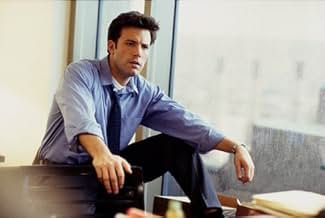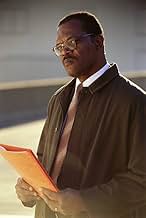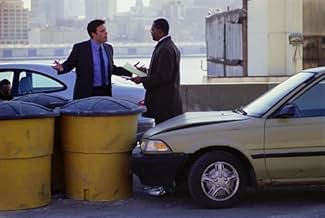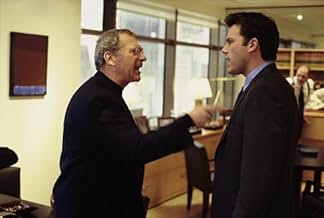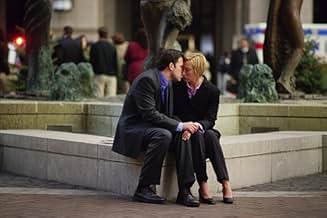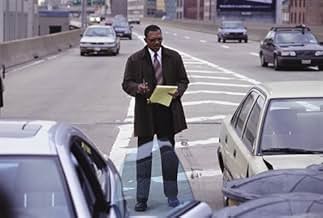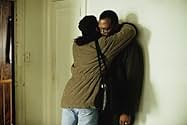La storia di un giorno a New York, quando un giovane avvocato e un uomo d'affari hanno un piccolo incidente d'auto lungo la FDR Drive e la loro rabbia sfocia in una lotta volta a rovinare l'... Leggi tuttoLa storia di un giorno a New York, quando un giovane avvocato e un uomo d'affari hanno un piccolo incidente d'auto lungo la FDR Drive e la loro rabbia sfocia in una lotta volta a rovinare l'uno l'esistenza dell'altro.La storia di un giorno a New York, quando un giovane avvocato e un uomo d'affari hanno un piccolo incidente d'auto lungo la FDR Drive e la loro rabbia sfocia in una lotta volta a rovinare l'uno l'esistenza dell'altro.
- Regia
- Sceneggiatura
- Star
- Premi
- 7 candidature totali
- Mina Dunne
- (as Jennifer Dundas Lowe)
- Gina Gugliotta
- (as Lisa Leguillou)
Recensioni in evidenza
High real world stakes.
Until the last ten d*** minutes when Afleck becomes essentially a super hero and fixes all the consequences for Jackson, despite how clear it was made throughout that most of these things could not be fixed.
Such an intelligent story ruined by one of the most careless yet brazen Hollywood endings in history.
I know *why* they make Hollywood endings, but I strongly suspect anyone that sat through this disturbing tale could handle a real ending. This ending is tantamount to all the dead people in Alien or one of the Hannibal Lecter movies all being AOK at the end.
I expected this to be a glorified version of Madd's Spy vs. Spy, or something of that nature, given the hype. However, it is not at the same pace at all... the violence is not cartoonish, its realistic. The characters are not simple, they are complex. They "have issues" and are both trying to find a better sense of balance in their lives, both do things which they regret... all in all, this is one of the most "human" movies I've ever watched.
Even though the characters are deep, the movie does not try to emphasis it with drawn out scenes with dramatic music or anything, which actually makes it more like watching real people than watching a movie. It also makes for a more powerful effect overall because it is up to the watcher to notice the subtleties.
The acting and directing are very well done, and there is some writing which surprised me in that it showed more about the characters rather than relating directly to the main conflict (I don't want to give too much detail and spoil it). The pacing is good and kept me interested throughout, partially to see what the main characters would do next and partially to see what, if anything, they would learn from the experience.
It is not as "epic" as something like Shawshank Redeption, and doesn't deal with esoteric themes such as Meet Joe Black or ominous themes such as Equilibirum or 1984(the novel), but in a way it is more epic because it deals with normal people who struggle to be beneficial humans despite major mistakes, pressures, and conflicts.
The story is slow-paced but this works in the film's favour, building up a realistic picture of life in New York and carefully developing the characters along the way. There are many twists and surprises in the cat-and-mouse game played out between the two men, and it's never quite possible to predict the outcome for this is an edgy, sometimes unsettling movie. In the end things do get a bit preachy and syrupy, but this doesn't matter, because the film's message is a strong one and the dialogue is not spoon-fed to the audience, a failing of so many modern films. Instead this is a film that doesn't underestimate the viewer, that is worth a look thanks to being so unconventional and intelligently-written and made.
Changing Lanes is much more complex than the trailer leads you to believe. From the preview, you'd think it is an action fan's over-revved, simple-minded revenge thriller with lots of vehicular mayhem. Believe it or not, it does more peeling back of the layers of insulation of the affluent/powerful end of the social spectrum than any film I have seen lately. (--And not in the way the disappointingly too-pat-to-downright-absurd 'John Q' did, either.)
It's a film noir, and one of the darkest at that, full of despair, cynicism and scathing revelations about human nature. It seems to say-- or really, and this is a major distinction, to be about characters some of whom believe-- that we all make deals of personal expedience with Morality, that no one escapes life formation uncompromised and therefore able to comment on or judge anyone else's choices or actions. It's the old amoral, nihilistic/relativistic universe routine, which says concepts of fairness, justice or morality are quaintly irrelevant, that stuff just keeps happening, always has and always will, que sera sera.
My favorite scene, which was revolting and ugly and creepy as anything in any horror film you can name, is when Affleck sits down in a fine restaurant to discuss with his wife the morality of the situation he has been sucked into and is getting in deeper by the hour. He recognizes rightly that his game of oneupmanship, and win-at-any-cost has gotten insanely out of control. He is beginning to question it all, everything in his life. He comes to his wife for solace, direction, insight, a hint of moral rectitude, any help she can offer. She helps him, alright-- by saying she knows he does dishonest things (like having an affair with a woman at the office, which up until she springs that, he thought was his little secret) and that she could have had an honest husband, if that was all she wanted. --Why would she make a scene over an infidelity and risk interrupting the flow of her resources, anyway, she asks. He splits the dinner, dazed and even more desperate. In the next scene we witness him doing more of those very things he has just been having moral anguish over. (Maybe he can't recognize the feel of moral anguish at first.)
The Affleck character has a tremendous amount at stake, courtesy a pretty nifty plot hook, that keeps him up to some very dirty tricks. Sure, he doesn't want to risk interrupting the flow of his resources, either. But I think it's clear that the real reason he keeps doing crummy things is because he is a man compulsively drawn to the rewards of a destructive mode of behavior. Others gamble or drink or eat too much. Affleck works the system, lying, cheating, and treating all people like garbage. That's his high, his inescapable need. He can't quit. (Late in the film, he agrees to hire an idealistic young intern because, he laughs uncontrollably to himself, he wants to see what the intern's optimism and altruism looks like after 5 years of hard weathering by his no-rules-in-life employer.) Affleck is sick, and while he finally recognizes that sickness, he resigns himself to keep doing the same thing because, as his boss tells himself, he is willing to believe he has done more good than harm at the end of the day. The Affleck character's motivations for being extra bad, in the episode of his life we glimpse here, are strong enough to keep Changing Lanes from being just another American psycho study; it's easy to believe we could turn Affleck, given a similar circumstance in our life.
The ending is a somewhat forced positive one, but not nearly as much a sell out as is usually the case with a made-by-committee major commercial film. I give the whole enterprise 8.5 out of 10 stars.
Affleck plays the role of the oddly named Gavin Banek (did they take the name Ben Affleck', throw it in a blender, and add some new letters for good measure?), a high-power lawyer on the verge of becoming one of the partners at his law firm, alongside his father-in-law. Jackson is Doyle Gibson, a reforming alcoholic father of two clawing his way out of his hole and trying to save his marriage. On a critical day in both their lives, Doyle going to court to try winning joint-custody, and Gavin on his way to seal his career-making case, the two get into a minor accident on the FDR turnpike, causing Doyle to miss his hearing and Gavin to accidentally give Doyle a signed document that is critical to his case and it all unravels from there.
The two tumble in a daylong haze of malice and self-destruction, sabotaging each other's lives. Whenever either decides to throw in the towel and do the right' thing, it is too late and the other has already escalated it to the next level. His life quickly falling down around him, Gavin begins to examine it for the first time, taking a deep look into his wife, his law firm, his boss/father-in-law, and himself ultimately questioning his motivation for trying to retrieve the document in the first place.
This is where the film really shines: many movies ask the question what makes a man?' but `Changing Lanes' does it with honestly and authenticity. The screenplay, by Chap Taylor, asks if it is success, or if its providing for one's wife and kids, or if its true goodness, avoiding superficiality and delving into the motivations for each. In one telling monologue, Gavin's father-in-law, played with perfect tone by Sydney Pollack, says, `At the end of the day, I do more good than harm. What other standard have I got?' Unfortunately, the movie does not really ask the question of what makes a woman, even though both wives show real strength. The movie does not even seem to suggest that Gavin and Doyle's struggles could even be applied to women (obviously they could, had the movie explored that).
Jackson, always an excellent actor, is great as Gibson even if he has performed better before. Surprisingly, in this film Affleck's acting actually seems to surpass Jackson's in this amazing performance that is probably the best we have seen from Affleck so far.
All of the characters in the film, including minor-roles and extras, all exhibit a very human feel, and seeing real-feeling people on the screen has always been something rare and not to be taken for granted. The viewer comes to care about everyone in the picture: Gavin, Doyle, their wives, the guy at the bank, even the stranger at the bar.
New York City itself is alive in this movie: it breathes, coughs, and gasps with Salvatore Totino's shaky, unsaturated, claustrophobic photography. Totino really looks at people and the city in the face, and does not try to make them prettier or uglier than they are. David Arnold's original electronic score is a refreshing change from the very poor attempts at orchestral music that most movies are now filled with. Arnold's score very effectively sets the mood and reinforces the tempo of the movie.
`Changing Lanes' is a success for Roger Michell that shows us that a movie can have major stars, be entertaining, glossy, substantial, and pensive all-at-once.
`Changing Lanes' is rated R for a fender-bender, destruction of office equipment, unseen infidelity, a shot of the World Trade Center, and honest depiction of the human condition.
Lo sapevi?
- QuizA day after the terrorist attacks of September 11, 2001, director Roger Michell had the World Trade Center towers digitally removed from the opening main title sequence in the film. In the DVD commentary, he admitted that it was a mistake to erase them, and make it appear as if they did not exist. During the re-editing of the film, Michell reinserted them as a tribute.
- BlooperWhen Gavin Lights the paper on fire and raises it to the sprinkler head, that type of sprinkler head would only discharge the water. No other heads would spray water. The reason for this is to minimize damage.
- Citazioni
Doyle Gipson: I hope you don't mind, but I was intrigued by your conversation. I just thought you were in advertising. So I want to give you my dream version of a Tiger Woods commercial, okay? There's this black guy on a golf course. And all these people are trying to get him to caddy for them, but he's not a caddy. He's just a guy trying to play a round of golf. And these guys give him a five-dollar bill and tell him to go the clubhouse and get them cigarettes and beer. So, off he goes, home, to his wife and to their little son, who he teaches to play golf. You see all the other little boys playing hopscotch while little Tiger practices on the putting green. You see all the other kids eating ice cream while Tiger practices hitting long balls in the rain while his father shows him how. And we fade up, to Tiger, winning four Grand Slams in a row, and becoming the greatest golfer to ever pick up a 9-iron. And we end on his father in the crowd, on the sidelines, and Tiger giving him the trophies. All because of a father's determination that no fat white man - like your fathers, probably - would ever send his son to the clubhouse for cigarettes and beer.
- Curiosità sui creditiThanks to the staff and Militia Force members and veterans at the Marcy Avenue Armory, Brooklyn, New York.
- Versioni alternativeThere was an early review of the movie that contained a spoiler of the ending. The ending that was originally used involved Ben Affleck and Samuel L. Jackson getting into a fist fight that leads onto the balcony. They talk about right and wrong and Affleck takes the file and tears it up and the movie fades to credits. This ending was most likely cut because test audiences did not like it. It will most likely appear on the DVD. Also a small clip shown in the TV ads shows Affleck and Jackson fighting on the balcony. This was part of the original ending which explains why it was cut.
- ConnessioniFeatured in Changing Lanes: The Writer's Perspective (2002)
I più visti
- How long is Changing Lanes?Powered by Alexa
Dettagli
- Data di uscita
- Paese di origine
- Lingua
- Celebre anche come
- Fuera de control
- Luoghi delle riprese
- Aziende produttrici
- Vedi altri crediti dell’azienda su IMDbPro
Botteghino
- Budget
- 45.000.000 USD (previsto)
- Lordo Stati Uniti e Canada
- 66.818.548 USD
- Fine settimana di apertura Stati Uniti e Canada
- 17.128.062 USD
- 14 apr 2002
- Lordo in tutto il mondo
- 94.935.764 USD
- Tempo di esecuzione
- 1h 38min(98 min)
- Colore
- Mix di suoni
- Proporzioni
- 2.35 : 1


